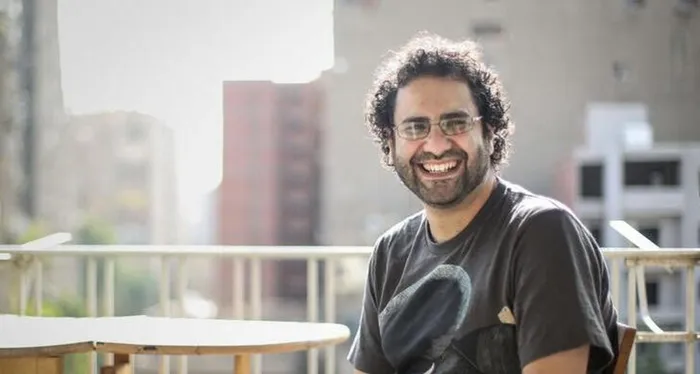Biden must act to end Egypt's brutal jailing of Alaa Abd el-Fattah

Picture: Omar Robert Hamilton/Handout via REUTERS /File – Egyptian-British hunger striker Alaa Abd el-Fattah in an unknown location, in this undated handout image obtained by Reuters on November 8, 2022.
By Amy Goodman and Denis Moynihan
United Nations delegates have gathered for two weeks in the exclusive Red Sea resort of Sharm El Sheikh, Egypt, seeking consensus on tackling catastrophic climate change. Unfortunately, this crucial summit, known as COP27 for the 27th Conference of Parties to the United Nations Climate Change Convention, is being hosted by Egypt, one of the world’s most repressive governments.
Its autocratic ruler, Abdel Fattah El-Sisi, was a general when the Egyptian army refused to suppress the January 2011 Arab Spring mass uprising centred in Cairo’s Tahrir Square. After the Egyptian people overthrew the long-standing, US-backed dictator Hosni Mubarak, they held elections and formed a popular government. That didn’t last long. A 2013 military coup followed by a sham election put al-Sisi in power. He enjoys full support from the US government despite being more repressive than Mubarak.
An example of al-Sisi’s brutality is the imprisonment of 40-year-old writer and organiser Alaa Abd El-Fattah. Alaa, who holds joint Egyptian/British citizenship, has been imprisoned for most of the past ten years, targeted for eloquently advocating for democracy and liberation. Alaa was key during the Arab Spring, inspiring people with his words and creating free-speech tools on the internet.
In the violent Egyptian police state with pervasive surveillance and omnipresent secret police, though, advocating for freedom is a crime. Desperate after a decade of arbitrary and abusive detention, Alaa Abd El-Fattah began a hunger strike over 220 days ago. On November 6, as COP27 opened and world leaders descended on Sharm el-Sheikh, Alaa escalated his fast, refusing water as well. Without immediate international intervention, Alaa will likely die before the final gavel drops on COP27.
Alaa’s mother, Laila Soueif, has been waiting every day outside the prison where her son is locked up, demanding proof he is still alive. A mathematics professor, she is a renowned human rights activist herself. On Thursday, she was told that her son had received an unexplained “medical intervention”. Human Rights Watch has warned Egypt against “imposing cruel, inhuman and degrading treatment”, and that “hunger striking is a political act”.
Alaa’s lawyer was informed that he could visit Alaa, but, upon arriving at the prison gate, was denied entry.
Alaa’s two sisters, Mona and Sanaa, staged a sit-in at the British Foreign Office in London, calling on the government of newly-installed Prime Minister Rishi Sunak to intervene on Alaa’s behalf and to bring him to the UK. Sunak, who is attending COP27, wrote to the family: “I will continue to stress to President Sisi the importance that we attach to the swift resolution of Alaa’s case, and an end to his unacceptable treatment.” Sanaa, 28, is now at COP27 and has helped bring human rights front and centre onto the climate justice agenda. Sanaa, who has spent three years in prison herself, has been threatened with arrest.
President Biden has enormous leverage over the Egyptian government and is attending COP27. Fifty-six Congress members have urged him to demand Alaa’s release. While campaigning in 2020, Biden actually tweeted in support of other imprisoned Egyptian dissidents, writing: “Arresting, torturing, and exiling activists … or threatening their families is unacceptable. No more blank checks for Trump’s ‘favourite dictator’.”
Instead of fist-bumping the US-backed dictator al-Sisi, the way he did with the autocratic head of Saudi Arabia, Mohamed bin Salman, Biden should demand the immediate release of Alaa and all other political prisoners. Laila Soueif wrote to Biden and other world leaders attending COP27: “If Alaa dies you too will have blood on your hands.”
In 2019, Mada Masr, one of Egypt’s last remaining independent news organisations, published a piece by Alaa, addressing the climate.
It also appears in Alaa’s book, You Have Not Yet Been Defeated:
“The crisis, for certain, is not a crisis of awareness, but of surrendering to the inevitability of inequality. If the only thing that unites us is the threat, then every person or group will move to defend their interests. But if we meet around hope in a better future, a future where we put an end to all forms of inequality, this global awareness will be transformed into positive energy. Hope here is a necessary action. Our rosy dreams will probably not come to pass. But if we leave ourselves to our nightmares we’ll be killed by fear before the Floods arrive.”
Alaa Abd El-Fattah should be attending COP27, addressing world leaders — not be on the edge of death in an Egyptian prison.
Amy Goodman is the host and executive producer of Democracy Now!, a national, daily, independent, award-winning news programme airing on over 1,400 public television and radio stations worldwide.
Denis Moynihan has worked with Democracy Now! since 2000. He is a bestselling author and a syndicated columnist with King Features. He lives in Colorado, where he founded the community radio station KFFR 88.3 FM in the town of Winter Park.
This article was first published in Commondreams